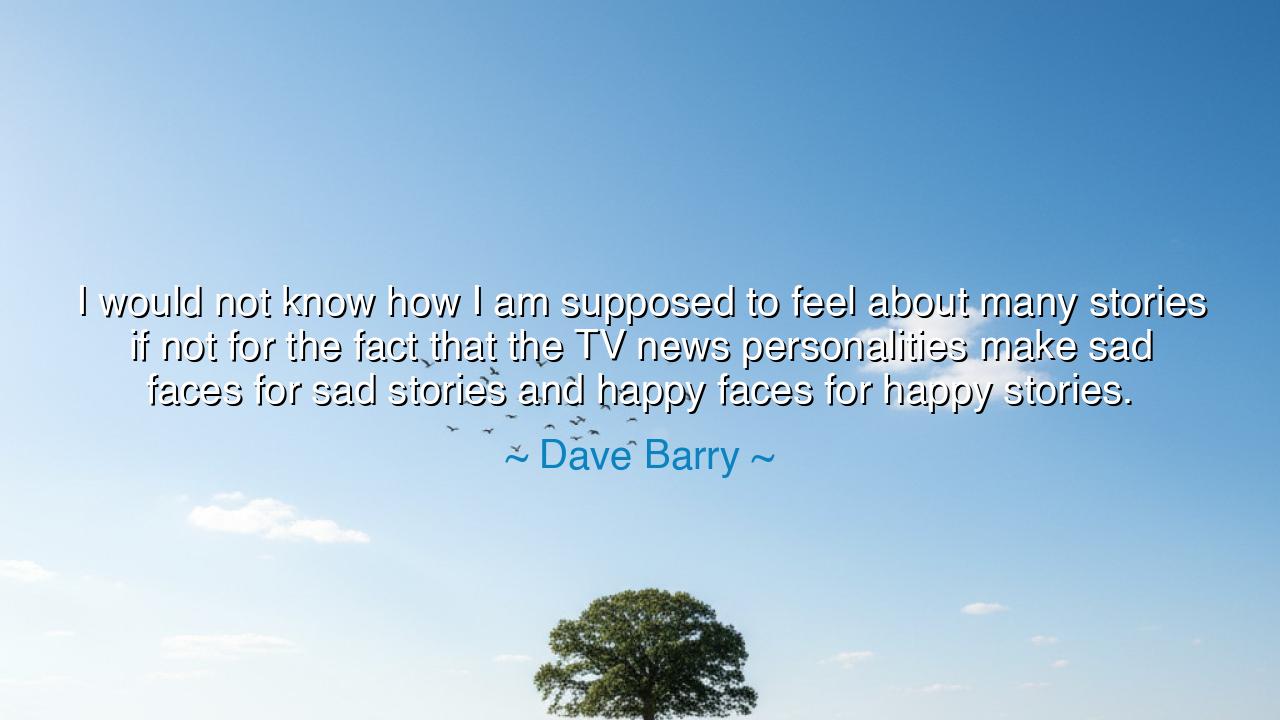
I would not know how I am supposed to feel about many stories if
I would not know how I am supposed to feel about many stories if not for the fact that the TV news personalities make sad faces for sad stories and happy faces for happy stories.






Dave Barry, master of satire, once declared with humor that cuts deeper than it first appears: “I would not know how I am supposed to feel about many stories if not for the fact that the TV news personalities make sad faces for sad stories and happy faces for happy stories.” Though the words sparkle with jest, beneath them lies an ancient concern—the shaping of thought and feeling by those who control the telling of events. For when the voice of the storyteller dictates not only what we hear but how we feel, the people risk losing the freedom of their own hearts.
The ancients revered the power of storytellers. The bard who sang of Troy, the herald who proclaimed victories, the priest who recited omens—all shaped not just knowledge but emotion. To cry, to rejoice, to despair—these were not born merely from the facts, but from the way those facts were told. Barry, in his satirical way, reminds us that even now, the faces of newscasters act as modern masks of comedy and tragedy, guiding the people’s responses as if they sat in an endless theater of daily life.
Consider the Roman bread and circuses, when emperors distracted the populace with spectacles. The gladiator’s triumph was cheered, the victim’s death was mourned, all cued by the reactions of the crowd’s leaders and the orchestrators of the games. The people were not asked to think deeply, only to feel as directed. So too with the news personalities—their smiles and frowns may seem trivial, but they shape the rhythm of the people’s emotions, training them to laugh at one story and grieve at another without asking: What do I truly feel?
Barry’s irony is sharp, but his sorrow is real. To rely on the faces of others to know whether we should be moved to pity or joy is to surrender the sovereignty of the soul. It is to allow another’s expression to dictate one’s inner truth. And in this surrender, one becomes not a free thinker but a passive spectator, taught not how to reason but how to react. The danger is subtle but immense, for a people who no longer choose their own feelings can easily be led wherever the storyteller wishes.
Yet the lesson is not to despise the news or the teller, but to awaken the self. The wise listener does not simply mirror the face of the speaker but weighs the matter within, asking: Is this tragedy truly mine to grieve? Is this victory truly mine to celebrate? For discernment is the shield of the free mind, and without it, men and women become puppets of performance, their emotions dancing at the pull of unseen strings.
History gives us examples of both blindness and awakening. In the days before the French Revolution, the court of Versailles painted the people’s misery as distant and irrelevant, while the public was entertained with festivals and theater. Yet when voices like Rousseau and Voltaire stirred the people to think and feel for themselves, the mask of the ruling storytellers was torn away, and history was changed forever. The awakening of authentic emotion, not dictated by power but chosen by conscience, became the spark of revolution.
Therefore, the teaching is this: guard your emotions as you guard your treasure. Listen to the stories of the world, but do not let another’s smile or frown dictate your soul. Seek to understand, not merely to react. When you watch, when you hear, when you feel—pause, reflect, and choose your own response. For in that freedom lies dignity, and in that discernment lies strength.
So let each who hears these words remember Dave Barry’s jest as a warning in disguise: laughter reveals truth more clearly than sermons. If you allow others to tell you not only what is happening, but how you must feel, you have already surrendered half your humanity. Reclaim it. Choose your own joy, your own sorrow, your own truth. Then, and only then, will you walk as a free soul in a world full of voices.






AAdministratorAdministrator
Welcome, honored guests. Please leave a comment, we will respond soon